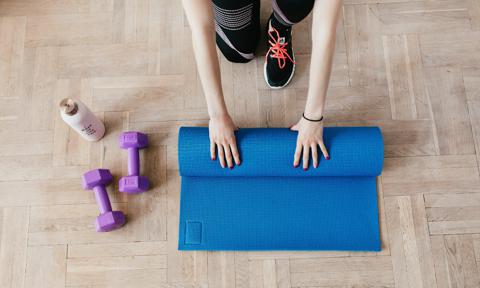
In the age of binge-watching and infinite scrolling, it’s easy to forget that we need at least eight hours of sleep every single day. But skimping on sleep can do more harm than good for you in the long run. Not only will lack of sleep leave you feeling dull and sluggish throughout the day, it can also negatively impact your immune system and mental health, cause unappealing dark bags to make home under your eyes and reduce your skin’s elasticity.
Sleep Disrupting Habits
Despite all your best intentions, you might be hindering your ability to fall asleep easily without even knowing. Here are some common habits that are preventing you from scoring the beauty sleep you deserve…
You’re eating or drinking too close to bedtime

While the importance of having fixed meal times cannot be overstated, you shouldn’t be too harsh on yourself if the schedule becomes erratic once in a while. Physiologically speaking, your body cannot fall asleep while it’s in the process of digesting food. Moreover, lying down while digesting food, can result in the stomach acid entering the esophagus, thus causing problems like heartburn and indigestion. Research also suggests that it’s best to keep snack time earlier in the evening as the body’s metabolism slows down since it starts preparing for rest and a slow metabolism can cause digestive issues in the future. When it comes to drinking, a glass of wine as a nightcap might seem like a good idea as it can make you feel pleasantly drowsy, but if you drink it frequently before bedtime it can mess up your sleeping pattern.
How to fix it: The one thing you can do is to ensure that there is a gap of at least two to three hours before your meal and bedtime. This will give your body enough time to digest and process the food properly. It would also be ideal if you started adhering to a fixed mealtime schedule to regulate the process. But if you’re someone who gives in to a midnight snack craving often, then stick to light and easily digestible snacks like almonds or bananas. As for alcohol, stick to two to three drinks per week to make sure that it doesn’t interfere with your sleeping pattern.
You have no fixed sleeping hours

You wouldn’t be alone in admitting that you lost track of time while binge-watching a K-drama until sunrise (they need to stop making them so addictive!). But it’s the weekend, you justify to yourself in a bid to feel less guilty about staying up all night watching Gong Yoo strut in space with a neck tattoo. It should come as no surprise that erratic sleep schedules aren’t really good for your body. Our body’s natural circadian rhythm is wired to respond to the rising and setting of the sun. This cycle determines when we’re most likely to feel bright and awake or tired and sleepy. If we continue to oppose our natural circadian rhythm then it causes an imbalance in the production of melatonin (which is the sleep hormone, for those of you not in the know) which can cause issues like chronic insomnia and disturbed sleep patterns.
How to fix it: The way to fix this is to start ensuring that you go to sleep and wake up at the same time every day. If you have a fixed time when you need to get up in the morning, then make sure you go to sleep at a time that lets you get proper rest for at least seven hours. Fight the urge to indulge on the weekends and maintain the same schedule to fix your sleeping habits.
You’re drinking coffee late in the day

This one should go without saying, but consuming caffeine close to bedtime is not helpful when you’re trying to correct your sleeping habits. Caffeine is a stimulant, which means that it energises the brain, as opposed to letting you relax. Ordinarily, caffeine stays in your system for about five to six hours, but this time can vary depending on consumption and your individual metabolism. If you’re consuming caffeine later in the day, it would still be in your system by the time bedtime rolls by, thus making it difficult for you to relax and fall asleep.
How to fix it: Make it a personal rule to not drink coffee, and other caffeinated beverages, after 2 pm. It’s also important to keep in mind that you might be consuming caffeine without knowing with foods like chocolate or some medicines.
You’re using your phone in bed

The production of melatonin, the sleep hormone, is influenced by light. This also includes the blue light that emits from your phone or any other type of screen. If you’re using your phone or tablet in bed, then it might mimic the effects of sunlight for your melatonin production and make it difficult for you to fall asleep easily. Other than this, the content that you are consuming can stimulate the brain, sometimes triggering responses like anxiety or excitement that instantly puts the body on alert and disrupts sleep.
How to fix it: Even though cutting down screen time is not a viable option for everyone, especially with social distancing rules making us increasingly dependent on screens for our day-to-day operations, you can start regulating your daily screen usage. Make sure you do not encounter any screens at least two to three hours before you go to bed. You can try reading or journaling before bed to help you fall asleep more easily. Another way to enforce this is to keep all screens out of the bedroom.
You’re working out late at night

While it’s true that there is no right time to work out, exercising late at night is not conducive to a proper night’s rest. When you exercise, your body releases endorphins and the core temperature of your body also rises. This results in a spike in adrenaline which keeps your body alert and unable to relax and rest. A proper night’s rest is very essential for getting the most out of your work outs.
How to fix it: Avoid cardio at any cost at night. Give your body an hour or two to unwind from a workout before bedtime. If you have no other option but to exercise later in the day, then make sure you’re doing light and relaxing exercises like yoga or stretching.
A small change in your routine can make a big difference in the long run. So keep that in mind while you work on correcting some of your habits and sleep well!
- Quick links
- sleep
- health
- mental health






